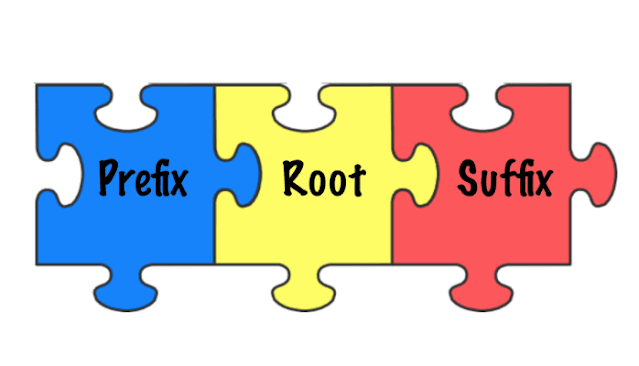Prefixes and suffixes are super useful for customizing the meanings of words, but what are they? A prefix is a group of letters (or an affix) that’s added to the beginning of a word, and a suffix is an affix that’s added to the end of a word. Prefixes modify the meaning of a word. They can make a word negative, show repetition, or indicate opinion. Some suffixes add to or change a word’s meaning. Others can signal the word’s part of speech or indicate verb tense.
Some Common Prefixes
Some of the most common prefixes in the English language are dis-, in-, and un-, which make words negative. For instance, adding the prefix un- to the word kind creates the word unkind, meaning not kind.
Another common prefix, re-, indicates repetition. For example, adding re- to the word build means “to build again.”
Other prefixes can indicate position: Sub(meaning under or below) is found in common words like subway and submarine. Supra- (which means above) often appears in medical terminologies, such as supraclavicular nerves, which lie on top of veins and bones.
Rules for Adding Prefixes
When you add a prefix to a word, you shouldn’t change the spelling of the original word or the prefix. The words disappear (a combination of dis- and appear), unhappy, and undo all illustrate this guideline. Follow this rule even if the spelling results in double consonants, such as in the words misspell, irredeemable, and cooperation.
You should use a hyphen when joining a prefix to a proper noun, as in pro-American. There should always be a hyphen after the prefix self- (as in self-esteem), and after the prefix ex- when it means former (as in ex-husband). Hyphens can also prevent misreading, mispronunciation, or confusion with other words. For example, you should hyphenate re-cover (to cover again) to avoid confusing it with recover. (to regain or repair).
ADVANCED VOCABULARY: The 100 Most Important Words for Achieving a B2 to C2 Level of English.
Some Common Suffixes
Some common suffixes are -ed, -ing, and -ly. The suffix -ed changes verbs to the past tense. In the sentence “Sandy shoveled the snow,” the -ed suffix creates the past tense of the verb to shovel. The -ing suffix makes the verb take place in the present, as in the following sentence: “Sandy is shoveling the snow.”
The suffix -ly is commonly added onto adjectives to form adverbs (words that describe verbs, adjectives, or other adverbs). Examples of adverbs with the -ly suffix include joyfully, quickly, and loudly. The suffixes -s and -es make words plural, as in foxes, lamps, and chairs.
Rules for Adding Suffixes
When you add a suffix to a word, the original word usually keeps its original spelling. However, there are some exceptions to this rule: If the original word is one syllable and ends with a single consonant, double the last letter. For example, tip becomes tipping or tipped, and run becomes running. If the word ends in multiple consonants, as in the word bank, last letter doesn’t get doubled.
I hope that this article has helped you to better understand the use of suffixes and prefixes.
Good luck and good teaching.
80 Essential Advanced English Phrases to Learn.
The 60 Most Important Phrasal Verbs for Achieving a B2 to C2 Level of English.
The 50 Most Important Idioms for Achieving a B2 to C2 Level of English.
200 Essential Words For Achieving a B2 to C2 level of Proficiency in English.
Tips for Learning Vocabulary in Context.
Enhancing Advanced Writing Skills Through the Use of Synonyms.









Advanced English: Enhancing Your Vocabulary With Prefixes And Suffixes. >>>>> Download Now
ReplyDelete>>>>> Download Full
Advanced English: Enhancing Your Vocabulary With Prefixes And Suffixes. >>>>> Download LINK
>>>>> Download Now
Advanced English: Enhancing Your Vocabulary With Prefixes And Suffixes. >>>>> Download Full
>>>>> Download LINK i4
It is an excellent way to improve your comprehension and ability to figure out what an unfamiliar word means. I do not believe that it does much to building your vocabulary. In all honesty, unless you are faced with a timed test, it is faster and easier to simply use a dictionary for new words. If one is reading online, tapping the word to open its definition is faster than either using a dictionary or using your knowledge of roots, prefixes, etc.
ReplyDelete